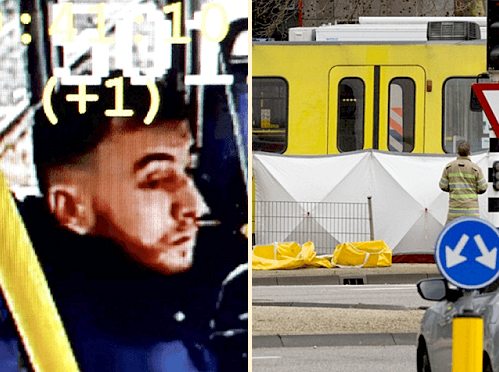
H. Numan reported a couple of weeks ago on the trial of Gökmen Tanis, the “Dutch” tram jihadist of Utrecht. In March of 2019 Mr. Tanis shot and killed four people and wounded six others in a terrorist attack on a tram in the Dutch city of Utrecht (he later confessed to the crime). At the conclusion of his trial, prosecutors recommended that he be sentenced to life in prison.
Last Friday the panel of trial judges took the prosecution’s advice and sentenced the perpetrator to life. Many thanks to FouseSquawk for translating this article from De Telegraaf:
Tram shooter Gökmen T.: Life in prison
by Saskia Belleman
Utrecht: Tears flowed in the hearing room of the Utrecht court where a handful of victims and their family members heard the sentence of life imprisonment for the tram shooter, Gökmen T. (38).
That, according to an audibly cold court president, Ruud Veldhuisen, is the only suitable punishment for Gökmen T., who on March 18 of last year “sowed death and destruction” on a tram at October 24th Square.
The court: “With no other goal other than to take lives, Gökmen T. stepped on the tram that day like a normal passenger. He then drew a pistol with which he shot at unsuspecting passengers in cold blood with calls to his god, Allah. Not once, but several times over the course of two minutes.”
The court spoke of “horrifying acts” by Gökmen T., which he justified by reducing his reality to an unreal rectilinear “we” vs. “you”: We Muslims are being destroyed worldwide by you democrats. That was the finish for him.
The experts in the Pieter Baan Center who examined him think that his acts did not come from a deeply-felt belief, but rather out of frustration over a failed life. The court: “Radicalizing and embracing extremist views as an unconscious strategy of dealing with problems and setbacks in his life.”
[Caption below picture: In one of the court hearings, Gökmen T. spits at his defense lawyer, Andre Seebregts]
The court accepts the conclusions of the experts concerning personality disorders and diminished accountability. But it estimates the danger of recidivism much higher than the experts do.
Despite his diminished accountability, the court finds that a temporary prison sentence in combination with compulsory TBS treatment does not do justice to the actions of Gökmen T. Life imprisonment is the only option from the point of view of punishment and the security of society. Moreover, the court wants to send a clear signal to others who might intend to carry out this type of attack. Then this is what follows: Life imprisonment. “That his crimes can be attributed to Gökmen T. in a lesser degree doesn’t change this judgment,” said the court.
The suspect was not present for the sentence due to the coronavirus crisis, and only eight victims and family members were allowed to be seated in the room, but the judgment could be followed by all via livestream.
The lawyers for the victims and family members reacted to the verdict with relief and satisfaction. The tram shooter’s attorney, Andre Seebregts, only wanted to say that he will consult with the dean of the bar association as to whether an appeal to a higher court should be filed. The counsel had argued for a prison sentence in combination with treatment. Gökmen T. himself wanted no legal assistance, and even spat at his lawyer during a hearing.

This judgment is a bright light.
The judges reject the canard of diminished capacity, mental illness, disturbed personality, and rehabilitation as the primary objective of imprisonment.
They instead focused on the destruction of the crime, the danger of a repeat offense, and the protection of society. In other words, punishment took on the objectives of actually protecting society and providing a punishment horrific enough that it might actually serve as a deterrent.
The justice system took a wrong turn when diminished capacity became a reason for diminished punishment. The concept kind of worked when the European societies were homogeneous, and the perpetrators really had a conscience to awaken. But, with the importation of genetic sociopaths, the concept of not guilty by reason of insanity is absolutely dysfunctional.
“and sentenced the perpetrator to life”
And he shall wear the sentence with pride for the 10-20 years they actually keep him locked up.
No, that won’t happen. The court could have sentenced him to 30 years. Which would make him a free man in 20 years.
In Holland ‘life in jail’ is exactly that: until the day you breathe your last sorry breath you remain in jail.
I hope life means life and not parole after six months.
Don’t tell me capital punishment doesn’t work. It does for repeat offenders.
Mashallah.
Teach these non-believers a lesson they will never forget !